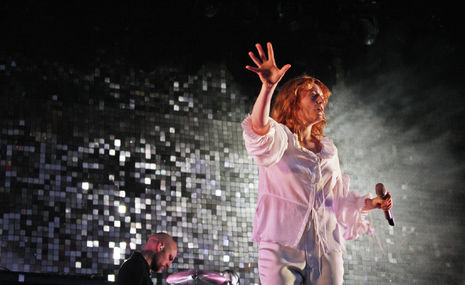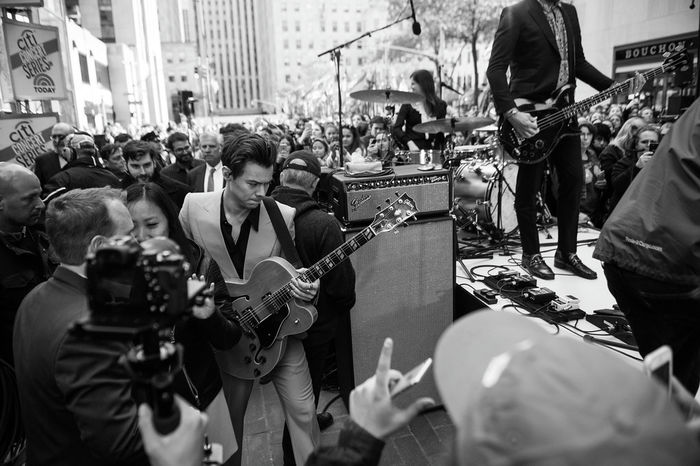Celtic witches unite: Dance Fever review
Liam Macmillan reviews Florence + The Machine’s latest release, Dance Fever

Amidst the rollout of her fourth album High as Hope, Florence Welch told Q Magazine that she was taking a break from music for the sake of her mental health. She appeased fan’s fears of her retirement, and after the final leg of her tour, disappeared back into her private world. A year later, the world was forced to do the same when the pandemic hit. Timing couldn’t be worse for Florence who revealed that lockdown hit right as she was due to commence recording with infamous indie-pop producer Jack Antonoff. The album, Dance Fever, couldn’t have been born at a more disconnected time, but that feeling of isolation is what catalysed its creation. Florence has poignantly said that “Gigs had been [her] churches, and live performance had been [her] spiritual practice.” For that to be taken away was rattling, and it’s that very feeling that permeates so much of the album.
“It’s Florence at her best, showing you the vitality of music, perseverance, and introspection”
It’s safe to say that Florence has returned to her maximalist style, but more than that — the album feels like she’s returned to herself. What she has created is her most realised and thematically expressive album with all the Machine’s flares that have been gradually evolving since Lungs.
The first single and opening track of the album is “King”, a rapturous builder underscored with raw acoustics and electronic subtleties like Antonoff’s signature “16th note”, here in a flickering synth bassline. Florence sings of gender roles, something we’ve not heard much of from her, and she does so with her usual fantasy flare: “I need my golden heart of sorrow, my bloody sword to swing, my empty halls to echo with grand self mythology.” Following a roaring bridge, the song sways into the signature F+TM harp and segues rapidly into “Free” — her most eclectic and joyous offering since “Dog Days”. The beat and the pulse of the guitars come right to the foreground to create a busy sound that’s as cacophonous as an anxious chest. Like “King”, it gently floats out into euphoria at its close. “Choreomania” is similar, though it begins with an amusing piece of spoken word about breaking down in public. The humour in her lyrics carries through as she imagines the second coming of Christ, rising as a clone of herself: “and all the Evangelicals were like ‘oh yes!’” With the panned yells of ”Something’s coming”, it’s (choreo)mania at its finest.
The album does well to sonically disperse its chaos with atmospheric tracks like “Back in Town” and “Prayer Factory” where her operatic vocals and ear for the eerie take centre stage. On the flipside, she offers “Heaven is Here” and “Restraint” — the children of “Big God”. They’re two short but feral interludes that imbue the album with her characteristic passion for witchiness, folk horror and raw acoustic experimentalism.
“She opens her arms to whoever’s listening, and we hear the sound of a roaring crowd that fades us into embracement”
Her music has often explored religious territory; both sonically and lyrically, she finds herself questioning or calling on God — something we saw in “Ceremonials”, now returning with a vengeance. “Girls Against God” tentatively steps forward to offer some of her most vulnerable lyrics underpinned by gorgeous chords and dynamic production from Antonoff. The song metamorphoses into a Florence-choir that channels into what sounds like a mellotron, and then into a cinematic finale featuring the sounds of clicking heels and Florence laughing to herself before delivering a hauntingly harmonic final verse. It’s moments like this that gives the album such charisma, like “Dream Girl Evil”, which is what rock and roll would surely sound like resurrected in Florence’s image. “Cassandra” and “Daffodil” provide cinematic proportions of production and insanity, much like “My Love” that euphorically floats in and out of a dance-pop infused existential crisis.
“The Bomb” is a tone shift with soft, jazzy drums and gentle guitar melodies. Maybe it’s because I’m a part-time English student and full-time hopeless romantic that incessantly channels their life into poetry, but the line “Sometimes you get the good, sometimes you get the song” has got to be one of the most heart-breaking lyrics I’ve ever heard. “Morning Evils” feels like a remedy to that. She opens her arms to whoever’s listening, and we hear the sound of a roaring crowd that fades us into embracement. Florence has found her choir.
I’ve never experienced a F+TM album the way I have Dance Fever. It deftly maintains her personality, the cinematic scope of her earlier works and the rawness of her latter without feeling like it doesn’t belong to a world of its own. It’s spiritual, raw, feral, but calm and collected. It’s Florence at her best, showing you the vitality of music, perseverance, and introspection. She’s shown us what it means “To be spared”, and she’s done it in the best way she knows how. Hold on to each other, and Dance Fever forever.
 News / Caius mourns its tree-mendous loss23 December 2025
News / Caius mourns its tree-mendous loss23 December 2025 Comment / Yes, I’m brown – but I have more important things to say22 December 2025
Comment / Yes, I’m brown – but I have more important things to say22 December 2025 News / Cambridge welcomes UK rejoining the Erasmus scheme20 December 2025
News / Cambridge welcomes UK rejoining the Erasmus scheme20 December 2025 News / CUP announces funding scheme for under-represented academics19 December 2025
News / CUP announces funding scheme for under-represented academics19 December 2025 Interviews / Politics, your own way: Tilly Middlehurst on speaking out21 December 2025
Interviews / Politics, your own way: Tilly Middlehurst on speaking out21 December 2025









